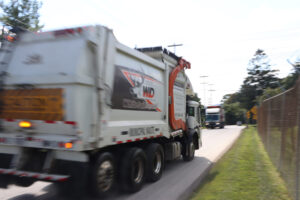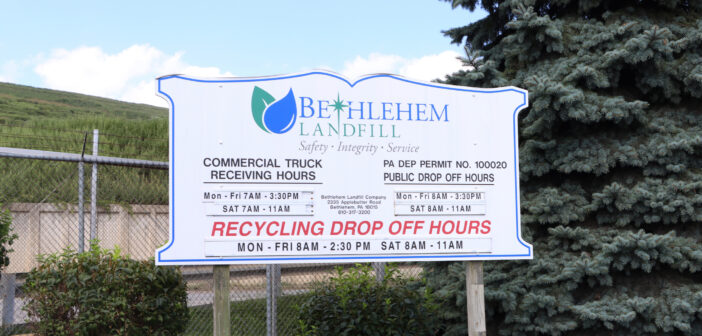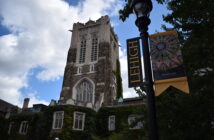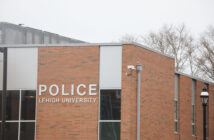Lower Saucon Township residents wrestle over the upcoming expansion of the Bethlehem Landfill by 86 acres, equivalent to about 65 football fields. The township’s council voted 3-2 for the expansion.
“There’s a direct impact to the environment because they’re taking up land that would otherwise be used for some other purpose, such as a forest or housing,” Benjamin Felzer, environmental science professor and vice chair of the Bethlehem Environmental Advisory Council, said.
He said leachate is a material that runs off from the landfill during rain and usually finds its way into the nearby rivers.
“There can be a lot of PFAS-contaminated leachate from the landfill going into the river causing water pollution problems,” said Breena Holland, political science professor and member of Lehigh’s Environmental Initiative. “There are people swimming in the river. There are fish in the river. It becomes the drinking water for Philadelphia.”
Although the Bethlehem Landfill does not accept hazardous waste, Felzer said there are still harsh chemicals, such as PFAS, which do not break down and can accumulate in the human body.
“Even if you’re not drinking that water, that water is going into everything,” environmental studies student Charlotte Harobin, ‘26, said.
The PFAS will affect everything downstream from the Lehigh River, Felzer said, including the Delaware River.
He said he attended a hearing at the Lower Saucon Township Council and noted Bethlehem Township did not have party status at any of the meetings, even though Bethlehem will be directly affected by the landfill’s pollution.
“What’s happening from the landfill will affect our entire community because it contributes to air pollution in the valley,” Felzer said. “Even if you are five or 10 miles away, it will affect you.”
Even though the landfill is in Northampton County, a lot of the trash in the landfill comes from out of state, with about half of its waste coming from New Jersey and other areas outside Pennsylvania.
Holland said those who are affected by the expansion are upset because they are paying the price for distant communities that do not dispose of their own waste.
“The purpose for this expansion is for profit,” Felzer said. “Lower Saucon Township wants to make money off of it. And of course, they’ll argue that it will reduce the taxes that citizens have to pay.”
Harobin said governments choose to set up landfills instead of more environmentally friendly waste management systems because these types of alternatives are much more expensive.
According to the United States Environmental Protection Agency, source reduction and reuse are the most preferred waste management tactics, which can take numerous forms “including reusing or donating items, buying in bulk, reducing packaging, redesigning products, and reducing toxicity.”
Treatment and disposal sits in the least-preferred spot on the United States Environmental Protection Agency’s Waste Management Hierarchy.

A Whitetail Disposal truck leaves the Bethlehem Landfill. The Lower Saucon Township Council voted to expand the landfill by 86 acres. (Frances Mack/BW Staff)
Holland said landfills are not all entirely bad, but, she does not believe it is fair to burden the Bethlehem community by expanding the Bethlehem Landfill when there are waste management alternatives.
According to the Bethlehem Landfill website, “With the addition of a Renewable Natural Gas facility at the Bethlehem Landfill, gas will be transformed into a cost-effective natural gas fuel source for the local community.”
Holland added that landfills are much better for the environment than incineration plants, and Pennsylvania has many regulatory rules in place so people dispose of their waste responsibly.
She said she has a significant problem with the governmental failure to respond to requests for waste reduction strategies and the lack of serious efforts toward reduction.
However, Holland said individuals can decrease the amount of waste they produce by taking responsibility for their own waste management, and that if it was more difficult for people to get rid of their waste, they would produce less.
“I think it’s outrageous that Lower Saucon Township is just pushing forward with this and trying to shove the expansion down the throats of citizens who are clearly opposed to it,” Holland said. “As far as I can tell, it’s an extreme violation of the Environmental Rights Amendment in the Pennsylvania State Constitution. It’s terrible, and I don’t think they’re going to get away with it.”






Comment policy
Comments posted to The Brown and White website are reviewed by a moderator before being approved. Incendiary speech or harassing language, including comments targeted at individuals, may be deemed unacceptable and not published. Spam and other soliciting will also be declined.
The Brown and White also reserves the right to not publish entirely anonymous comments.